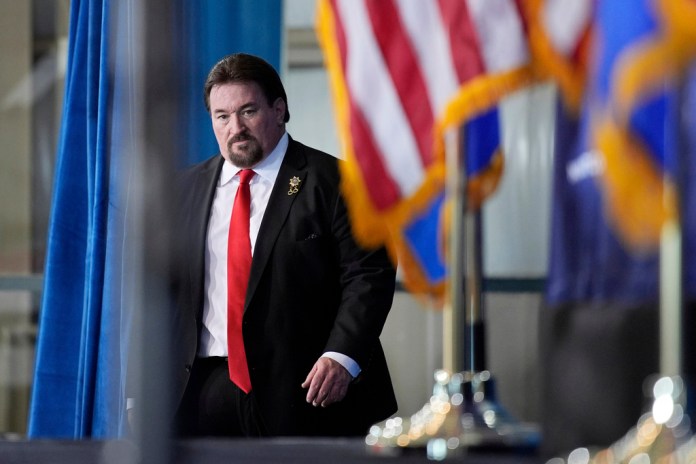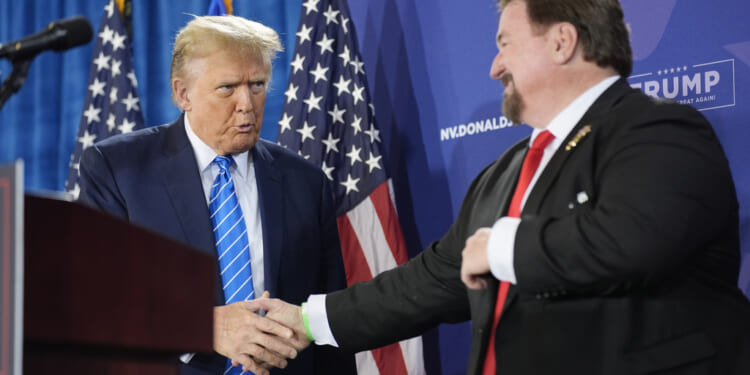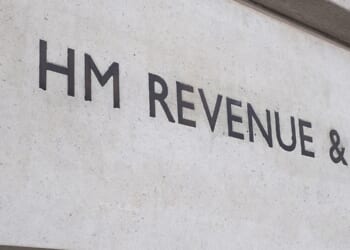President Donald Trump’s pardons of more than 70 allies involved in efforts to challenge the 2020 election have collided this week with new turns in the state-level prosecutions targeting the so-called “alternate electors” strategy.
The clemency order, a “full, complete, and unconditional pardon” for “all United States citizens” connected to the alternate-elector plan or to “efforts to expose voting fraud,” was signed last Friday and posted online Sunday night by Pardon Attorney Ed Martin. Although it does not apply to Trump, the proclamation covers dozens of high-profile aides, lawyers, and activists who were once scrutinized by former special counsel Jack Smith and by Democratic prosecutors in Arizona, Georgia, Michigan, Nevada, and Wisconsin.
While presidential pardons apply only to federal offenses, Trump’s sweeping action comes as several state-level cases reach critical junctures, including two criminal cases that were effectively revived following Martin’s pardon sweep.
Nevada Supreme Court revives alternate electors prosecution
The most significant new development this week came on Thursday evening, when the Nevada Supreme Court unanimously revived the forgery case against six Republicans who signed false 2020 elector certificates for Trump.
The justices ruled 6–0 that Attorney General Aaron Ford (D-NV) properly filed the charges in Las Vegas, reversing a lower-court venue ruling that had tied the case up for more than a year. Among the defendants are Nevada GOP Chairman Michael McDonald, Vice Chair Jim Hindle, and Republican National Committeeman Jim DeGraffenreid, all of whom were included in Trump’s federal pardons days earlier.

The charges carry up to five years in prison and, because they are state offenses, remain unaffected by the pardons. The ruling stands in contrast to Michigan, where a judge dismissed charges against 15 electors last fall, citing a lack of criminal intent.
Georgia case jolted back to life under new prosecutor, three charges against Trump tossed
In Fulton County, the sprawling Georgia racketeering case against Trump and more than a dozen allies will continue for now under an unexpected new prosecutor, though the future of the case remains hazy.
Peter Skandalakis, director of the Prosecuting Attorneys’ Council of Georgia, appointed himself Friday to take over the case after a monthslong effort failed to produce any outside prosecutor willing to handle it. His move arrived just hours before a deadline imposed by Fulton County Superior Court Judge Scott McAfee, who had warned the case would be dismissed entirely if no appointment was made by Friday morning.
Shortly after Skandalakis’s appointment, McAfee dismissed three charges against Trump, all tied to allegations that he and several co-defendants filed false documents in federal court. The ruling had been widely expected, as McAfee had previously signaled that those counts were legally vulnerable before the case was paused due to the effort to remove former District Attorney Fani Willis.
The broader indictment remains intact, although Skandalakis’s assignment to the case raises more questions about its future and whether he will decide to continue pursuing protection. He said his team has “diligently” reviewed the matter and emphasized that Trump’s federal pardons “do not affect state charges.”
While Trump remains a named defendant in the case, he cannot be tried, forced to appear, or subjected to criminal action while he is serving his presidential term, which ends in January 2029.
Trump attorney Steve Sadow on Friday urged dismissal of the remaining counts, arguing the “politically charged prosecution has to come to an end.”
NEW PROSECUTOR TO OVERSEE GEORGIA RICO CASE AGAINST TRUMP ALLIES
Where the remaining state cases stand
With Nevada and Georgia moving forward on separate tracks, three other battleground states are still navigating unresolved alternate-elector prosecutions.
Arizona: Attorney General Kris Mayes must decide by Nov. 21 whether to ask the state Supreme Court to review a trial judge’s ruling that sent her case back to a grand jury. Political analysts note her recent comments suggest she may be preparing to drop the prosecution, but she has not signaled her clear intent publicly.
Michigan: Attorney General Dana Nessel (D) may still file a delayed appeal before March 2026 after a judge dismissed charges last fall against 15 electors. Michigan remains the only state where the prosecution has fully collapsed.
Wisconsin: A criminal case remains active against three Republican electors after a judge refused to dismiss the charges in August. No trial date has been set, but prosecutors have indicated the case will continue.
















